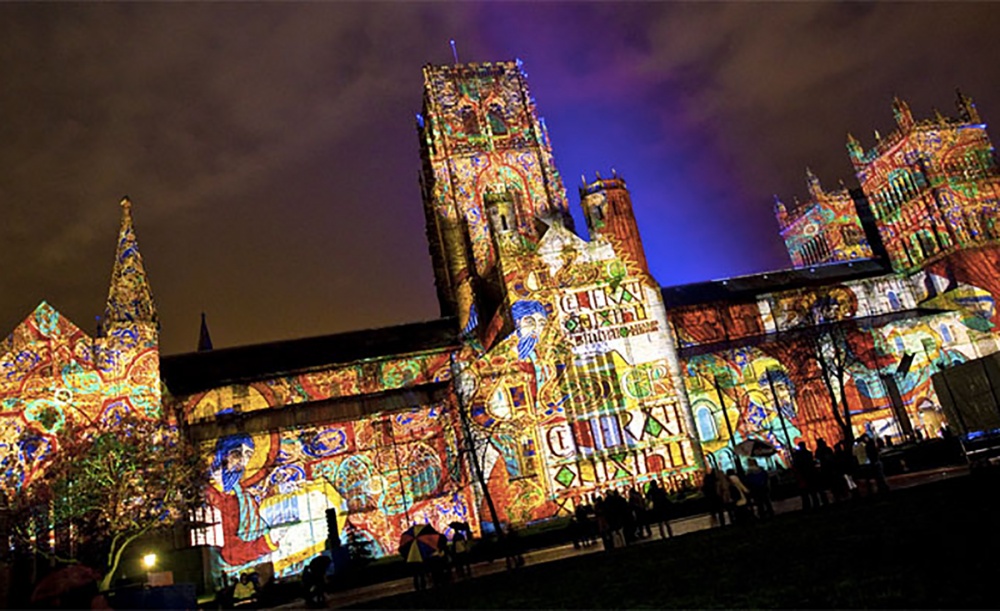Q&A with Isobel Waller-Bridge

Award-winning composer Isobel Waller-Bridge has appeared in film, television, and at the Royal Albert Hall, but you can hear her latest composition much closer to home – at Durham’s Lumiere Festival
Could you tell us a bit about the collaboration you’re involved with for Lumiere?
The project, The World Machine, will tell the story of the birth of modern cosmology through a son et lumière – images will be projected onto Durham Cathedral set to a 10-minute musical score. The people that they’ve got involved are amazing – Carlos Frenk, a Professor of Cosmology at Durham University, directs the world’s most famous theoretical cosmology research group. He’s putting together film footage of dark matter that will be blown up by the video artist, Ross Ashton. The story will start with the early understandings of the universe, going through Medieval philosophies until we reach the present day. Because science and art have such different outlooks on the universe, it’s controversial – but all the more interesting.
How have you found working on the project?
The story is dramatic, and there’s a very strong narrative – musically, that’s wonderful. Without dialogue, the music really comes to the fore, right there with the images. When I met with Helen Marriage, Director of Artichoke (the event company behind Lumiere), she said, ‘This is an epic thing, and you can write epic music.’ Being asked to go big, that was exciting.
How does the creative process work?
It’s very different to a normal film where you’d see the whole cut first, and then score it. We talk about it, think about what part goes where, and then they’ll send me through snippets of film. As a chicken-and-egg kind of process, it can be harder – it’s a case of using your imagination in a different kind of way.
What is the normal process of composition?
First off, I say yes to the job. Then I panic. One of the best bits is the beginning: but that’s followed by various degrees of anxiety. Fear is really important to me – it gets to a point where I can no longer ignore it, and I have no choice but to sit down and write. The hardest part is starting. If I’ve got three weeks to do something, I tend to be writing in the last few days. I like to spend the first couple of weeks immersing myself into the broad picture; the scientific side of it, the artistic side of it... I always wonder whether it’s a good idea to listen to music – but it’s never a good idea. Ultimately, when you get into the recording room with the musicians, after weeks on your own, you remember why it’s all so magical.
What does an average day involve?
I have a studio at home, so the first thing I do is walk around the block; once I’m in the studio, time becomes a non-entity. Crucially, I stick to pencils and manuscript paper – I’ve found that the computer sample technology these days can change the way you write. The ideas come quickly, but the writing process – deciding what instrument to use – if someone didn’t say time up to me, I’d just keep going. That detailed stuff I really love.
How did you get into composing?
I started out studying music, thinking that I’d end up as a pianist. Then one day somebody at university asked me to write something, and I enjoyed it so much that I kept doing it. I went to King’s College London where I studied very serious music – no melodies – before being offered an assisting job working for a film composer. After studying atonal music for five years, it was suddenly all about melody. I used to invite my mum to concerts where instead of playing the piano, I’d be in the piano, plucking things, and then finally I had the chance to play her nice pieces with melodies and harmonies. She’s always been supportive, but she’s ruthless with her opinions – if she likes it, you know you’re on the right track.
Are you a big film and TV buff?
I watch loads of films. I love the scale of them – there’s so much that you can do with story telling, it’s limitless. Best of all, television is so sophisticated now; the gap between film and TV is closing. The big-budget long-form television series happening now here and in the States are so exciting, and the people writing music for them are amazing.
Do you have a favourite soundtrack?
Bernard Hermann’s score for Taxi Driver is one of the all time greats.
Do you ever find yourself composing whilst watching TV?
I’ve definitely noticed that recently. I’m very sensitive to the music, almost too aware. If you asked a screenwriter, they’d say the same about dialogue. It can get very distracting.
Do you listen to music in your spare time?
I find it difficult to listen to music. On car journeys especially, I relish the silence. There are particular musicians and recording artists that I love and listen to, but because I spend so much of my time listening for work, I’ve grown to enjoy the quiet.
Will you be coming down to Lumiere?
I wouldn’t miss it. Even if I wasn’t writing the music, I would want to go. These guys are the coolest people I’ve worked with, they’re so inspiring – it’s going to be spectacular.
Lumiere Durham will run 12–15 November. For more information visit www.lumiere-festival.com




